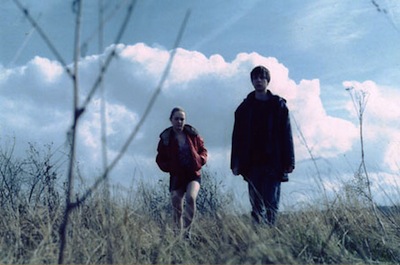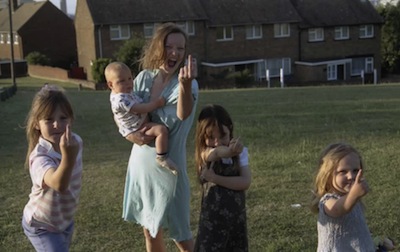
It was only some time after I had finished watching Fish Tank that I started to realize that this movie is like a British version of Precious: Based on the Novel 'Push' by Sapphire [review]. It didn't occur to me during the screening because the two movies couldn't be more stylistically different, nor could they be farther apart in terms of artistic success. Both films are about young women living in poverty who dream about doing something flashy with their lives, but who must battle a lack of education, an uncaring mother, and the inappropriate advances of older men before they'll ever get a chance. Where Precious is manipulative and aesthetically cheap, however, Fish Tank is smart, emotionally honest, and technically restrained.
Fish Tank is the second film of writer/director Andrea Arnold, who previously made the stark crime drama Red Road [review]. For her sophomore outing, she employs a similar digital, Neorealist style. Shooting on location with no musical score, she follows her main character Mia, played by a wonderfully effective first-timer named Katie Jarvis, through her day-to-day routine in an Essex housing project. She gets in fights, practices her dance moves, and wanders aimless and alone through the streets. When her mother (Kierston Wareing) brings home a new boyfriend, Connor (Michael Fassbender), Mia is attracted to him sexually, but also touched by the kindness and interest he shows her. He'll encourage Mia to pursue dancing and to open up, but when he moves into the apartment, Mia's attraction reaches a boil.
The final portion of the film is devoted to how Mia deals with this new attention and the fallout it causes. It's a strange, volatile ride. Her immaturity becomes more apparent with each irrational decision. Consequences don't seem to enter into the girl's mind before she does anything. Katie Jarvis is utterly convincing as the sullen teen whose rage seethes just below the surface. Fassbender is also very good, charming the audience into hoping he's not too good to be true. I really, really wanted to like him. He's a little like Peter Sarsgaard's character in An Education [review], except he's not Peter Sarsgaard, so it's not a foregone conclusion that he's creepy.
Most of Fish Tank is appropriately underplayed. Andrea Arnold doesn't rely on her characters to explain what is going on, she is far too intent on showing us through actions and reaction. (Something Lee Daniels, the director of Precious, is by all evidence incapable of.) Her camera practically stalks Mia, often having to run to keep up with her. Fish Tank is essentially a point of view film, Katie Jarvis is in every scene. The only time Arnold strains for a shelf she can't quite reach is when she tries to inject literary and visual metaphors into the movie. There is a thread involving a horse that was obvious enough before Arnold decided to put a finger right on its nose at the end. The final shot of the film is also a bit too "high school poetry" for my tastes.
Still, that's maybe four scenes in a two-hour movie. Not a bad ratio when you consider how much so many other directors get wrong in half the time.

Criterion has chosen to enhance their gorgeous Blu-Ray of Fish Tank with the three short films Andrea Arnold made prior to Red Road, and these early effort are as worthy of exploration as the main feature.
Milk (1998) (10 minutes, 30 seconds): From the get-go, Arnold was fascinated by the careless, seemingly simple choices people make in their day-to-day lives that lead to unintended, complicated consequences. In Milk's second scene, a woman (Lynda Steadman) decides to let her partner (Stephen McGann) forego wearing a condom; cut to nine months later, and the baby is coming. The child doesn't survive a difficult birth, and the mother is thrown into grief. Rather than go to the infant's funeral, she randomly chooses a juvenile delinquent (Lee Oakes) out for a smoke and goes with him on a day trip in a stolen car.
There is a running thread throughout Arnold's work that sews people together who otherwise maybe are not right for one another. The grieving mother here is aching to relieve herself of her sorrow, and she wishes to feel something intense enough to overshadow the severity of her depression. Her hook-up is driven by her maternal instinct--the boy is wounded, he has a "Mom" tattoo--in much the same way Mia's misguided fixation on Connor is motivated by her need for a father figure in Fish Tank. The woman here needs a release, and though a sexual one will do, there are also more literal and physical releases required--we might miss the tears if fixating on the unexpected element of the short's final image. Arnold sees a fine line between the beautiful and the grotesque when it comes to the demands and functions of our bodies, though in the matter-of-fact way she presents it, it seems that line is only visible depending on one's perception of it.
In terms of style, there really isn't any distinctive evidence of Arnold's specific aesthetic in Milk. The telling of this tale has as realistic a grounding as her later films, but the presentation is far more conventional. Not in a bad sense, this is a young filmmaker feeling her way. Her intentions and passions are clear, this is her mastering the tools.

Dog (2001) (10:16): The second short subject not only introduces the looser camerawork approach into Arnold’s repertoire, allowing for a more intimate and less formal observation of real life, but it also appears to be the early groundwork for Fish Tank. From the opening scenes in an upper-floor apartment in the British projects and the film's heroine standing on the side of a highway shouting across traffic at a boyfriend, it's clear to see these are the first seeds of the full-length to come eight years later.
Joanne Hill plays the lead, a teenage girl out for a day with a sullen boy (Freddie Cunliffe). The pair score some drugs and then go to a vacant lot to smoke them. There the boy and girl engage in dispassionate sex. She wouldn't mind a little tenderness, but he won't even kiss her. A stray dog that the girl spotted earlier wanders onto the scene, eats the remaining hash, and promptly gets beaten by the boy. The violence erupts with all the fire and fury that the sex lacks, an adult irony that the girl desperate to grow up didn't account for. Pushing the boundaries of her age, sexualizing herself before she is mature enough to handle it, has put her in a position she is not ready to handle, but now that she has gone there, she can't go back.
Arnold's efforts to draw a connection between what happened to the dog and what is happening to the girl may be a little too direct--those bothered by the blatancy of the horse in Fish Tank won't like it much better when it's a canine-- but Hill is very good, and when the director moves in tight on her weeping, there is no overselling the potency of the underlying emotion.
Wasp (2003) (25:46): This Oscar-winning short was the first time that Andrea Arnold worked with cinematographer Robbie Ryan, who would shoot both Red Road and Fish Tank. You will notice an immediate and obvious difference. Though Wasp was filmed in the same poor backstreets as Dog, there is a crispness to the photography and a more vivid realization of the colors of real life, the garishness of how people dress vs. the drab reality of their surroundings.
Natalie Press plays Zoe, a single mother of four struggling to get by. Though our first image of her is as a fierce, albeit ineffectual, protector, Zoe's selfishness is quickly revealed when an old flame (Danny Dyer) reappears in her life. Rather than miss out on a chance at a date, she lies and pretends her kids belong to someone else, and when she goes to meet him at the pub, she leaves her offspring in the alley outside.
Arnold presents Zoe with a moral quandary--her own happiness can be achieved at the expense of her progeny--the terms of the dilemma are far more base, almost primitive. The question is not just one of abstract inner satisfaction, but one of basic physical compulsion. As in Milk, our bodies compel and demand. Here, sexual pleasure is directly weighed against hunger--opposing needs of fundamental human survival. Arnold pushes it further with the wasp that provides the narrative shift in the final act: if these deeply rooted urges are all that we allow to influence our decisions, then the threat of external forces, of nature itself, holds sway. If we surrender moral reasoning, we retreat to the animal kingdom.
It's easy to see how Arnold transitioned from Wasp to full features. It's her most accomplished work up until that point, and maybe the most fully realized of all her movies, long or short. Here she manoeuvres her actors and her mise en scene with a steady confidence, finding that balance between realism and fictional narrative that has since allowed her work to stand out, and that made Fish Tank such an incisive examination of the kind of emotional battlegrounds that know no age. In Arnold's work, the casualties are young and old, all are equal.


3 comments:
I hadn't really thought of the "Precious" comparison, (that movie's weight decreases with every second, like, er, "Precious" at a particularly effective fat camp.) "Fish Tank" was absorbing, and you're also right about Michael Fassbender and how one spends half of the time like: "Oh, please, please, turn out to be a semi-decent bloke, pleeeeease don't rape the girl."
Wow, this is really cool!
This is a great blog
Post a Comment